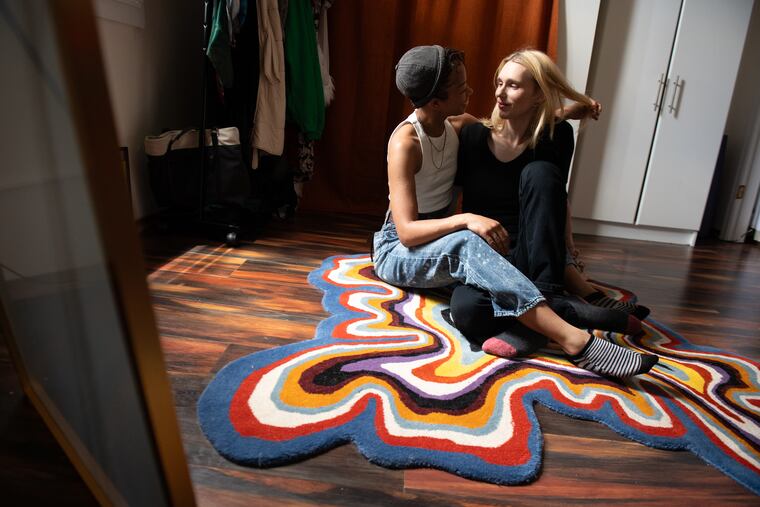In your presence, I feel like I can breathe
Too often we focus on trans pain, trans death. But trans love exists in Philadelphia, too.

I grew up as a fan of romantic “dramedies” — I loved everything from The Princess Diaries and You’ve Got Mail to Dan in Real Life and Mozart and the Whale. But despite my best efforts for a real-life happily-ever-after relationship, things would usually fall apart after a few months.
Healing is never linear, and sometimes experiencing a healthy relationship can be the most challenging of them all. My partner and I lovingly call our story, “Seeking co-regulation partner for complex trauma recovery.” Our love is one of healing and connection.
When describing how we first met, my partner, Jet (she/they), recalls, “Feeling like I could breathe in your company.” The feeling was mutual.
As lesbians with a gender-variant twist (I’m a trans woman and my partner is agender), we reflected on how hard we’ve worked to let our love burn slowly. We still recognize how fragile this relationship can be at times, opting for slower, trauma-informed mutual care that transcends whether or not we continue to call ourselves a couple.
Our love remains in the ability to continually choose each other, and that’s what we try to do.
Like many queer couples, we have to navigate complicated mental health needs. The prevalence of post-traumatic stress disorder in the general population is around 6.8%. However, estimates go as high as 61% for transgender people.
For my partner, who is also Black, very little is understood about the exact rates of post-traumatic stress disorder among people of color; a 2018 study of 106 counseling professionals found that 71% had encountered race-based trauma in their clinical work.
Many studies find such high levels of trauma can cause many other chronic conditions to develop, such as bipolar disorder, obsessive-compulsive disorder, and addiction. Disorders like these can be harder to identify when many of us in the transgender community lack access to health care compared with the general population. Jet and I both fight through so much stigma to feel seen within ourselves, our community, and this relationship.
For my partner, one of their core values is to experience love beyond forced responsibility and to push the limits of what a chosen family can be. However, finding your chosen family as a newly out trans woman can be isolating, and I struggled to let the right people in.
”It would be inappropriate to reflect on your early transition,” Jet told me recently, “but I can reflect on the people you chose to surround yourself with in those early days, and how that personally affected my ability to trust you. But I saw how quickly you grow, and that made things a lot easier.”
“Even though the rate of change for both of us has been so rapid, nothing has felt more fulfilling than this relationship,” Jet said. “It’s been challenging, but in a good way. I feel really grateful because it brings me joy to be in proximity to your experience as you get to know yourself.”
“That’s what I want for myself,” Jet said. “That’s what I want to surround myself with. And it’s just so cool that we don’t have to do it by ourselves.”
In the ongoing struggle for human rights and equality, the fight for trans rights occupies a critical space. Discrimination, marginalization, and violence continue to be major factors in our lives.
It’s not a shocker that when it comes to romantic love, most of us report long-lasting intimacy as the highest-rated factor when seeking a relationship. And it makes sense. The benefits of being in a high-quality and satisfying relationship are widely understood. In addition to improved mental health and overall quality of life, studies find those in romantic relationships report higher self-esteem and lower levels of anxiety and depression.
However, reports also show only about half of trans relationships survive through gender-affirming care. Even well into transition, most trans adults I know continue to struggle to find healthy romantic experiences.
At a basic level, trans people deserve recognition, protection, and respect. But when those fights are already so exhausting, it can feel wrong to have to remind people we also deserve love.
Daisy Love James is a writer, musician, and audio engineer in Philadelphia.